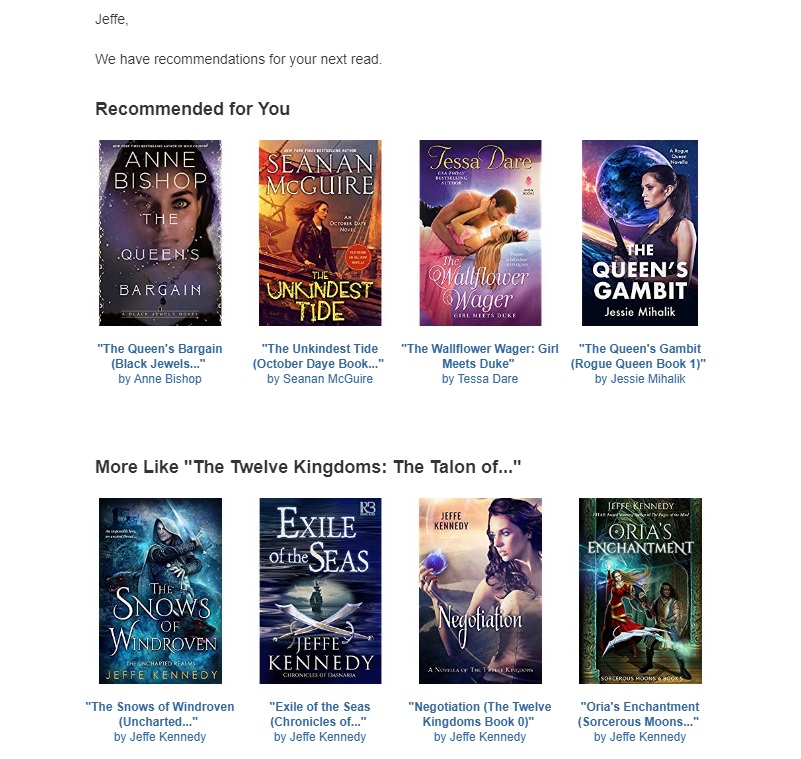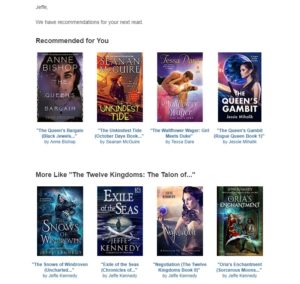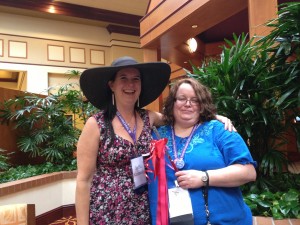

RITA ® Award-Winning Author of Fantasy Romance




Sometimes I buy my own books on Amazon. There are a few reasons for this, the primary one being that some publishers, like Kensington, never give me finished digital versions of my books. That means that the last version I’ll have of any of my Kensington books is the Word document where I reviewed copy edits. Yeah, I can accept all changes and make a reading version to send to my Kindle – and sometimes I do that – but the formatting is funky and there can be distracting errors. So, if I want to revisit one of my books and read it on my Kindle (like if I’m not at home to grab the paper copy, or if I want to search for something and not read on my laptop) then it sometimes makes sense just to buy the ebook.
Yes, it IS kind of weird to buy my own ebook.
But, I figured I get some of that money back in royalties, and it gives the book a bump in the Amazon algorithm, which never hurts.
So, I did this last week with THE TALON OF THE HAWK. I’d just finished reading Kennedy Ryan’s LONG SHOT, which deals with an abusive marriage (and is *excellent*), and it got me thinking about how I dealt with recovery and healing from sexual assault. This isn’t something I mentioned about THE TALON OF THE HAWK for a long time, because it felt spoilery, but the book has been out for enough time now that I think I can. The heroine, Ursula, suffered sexual abuse in her youth and wrestles with the scars it left behind. I wanted to reread what I did as a foil to what Kennedy Ryan did in her book.
It was an interesting exercise, and I learned quite a few things about my own writing.
Anyway, today, I got this email from Amazon with “Since you read THE TALON OF THE HAWK.” I get these all the time, as we all do, and I never open them because Amazon is always wrong. This time, though, I thought I should look, just to *see* what their AI thinks is like my book. Thus the screen shot above.
The Tessa Dare historical romance is a bit of an outlier – though I don’t care since Tessa is wonderful – but otherwise it’s pretty damn close! Go figure. And I’m pretty chuffed to be listed with Anne Bishop and Seanan McGuire! And Jessie Mihalik is my agent-sister and an awesome writer of SFR.
I’m over at The Romance of Reading Facebook page today, talking about The Magic of Books. I’m also doing some book giveaways, so come on by and chat!
 The other day I saw yet another article on how we read differently on paper versus electronically. Inevitably it was posted by a writer friend who rather smugly added the comment that she has gone back to reading on paper. That’s the part of all of this that bugs me, that these articles and “research studies” seem to be always accompanied by the attitude that reading on paper is virtuous and reading electronically is Bad and Wrong.
The other day I saw yet another article on how we read differently on paper versus electronically. Inevitably it was posted by a writer friend who rather smugly added the comment that she has gone back to reading on paper. That’s the part of all of this that bugs me, that these articles and “research studies” seem to be always accompanied by the attitude that reading on paper is virtuous and reading electronically is Bad and Wrong.
Now, I obviously have a horse in this race because 12 of my 14 released books are available in digital form only, and all are available in digital as well as on paper. More than that, I am a digital reader. I love love love how being able to have an ereader has changed my life. From the instant availability of the books I want to read to the desperately needed reduction in bookshelf space, ereading has been a major blessing for me.
There. I’m biased,
So are these articles, only they don’t admit to it. Worse, they make irritating leaps of logic. Most of you know I come from a science background, so I tend to read for how well a study is constructed. A well-constructed experiment controls for variables. If we’re going to make statements like this from that article:
Neuroscience, in fact, has revealed that humans use different parts of the brain when reading from a piece of paper or from a screen.
You have to define the terms. I won’t get started on the irresponsible use of the umbrella term “Neuroscience,” as if that’s not a field that comprises thousands of disciplines. We might as well say “Science has revealed!” Oops, guess I did get started on that. The real transgression in that sentence – indeed through that entire article – is that the terms “reading” and “screen” are never defined. Reading what on what kind of screen? It matters, particularly if we’re comparing it to reading what they DO specify as “deep reading” – the concentrated kind we do when we want to “immerse ourselves in a novel or read a mortgage document.
Okay, so if we want to really evaluate what parts of the brain we use while reading on a screen vs. paper, then we have to control for EVERYTHING except the one difference: digital vs. paper. But they don’t do this and it makes me crazy!!! Instead they say things like:
And that uses the kind of long-established linear reading you don’t typically do on a computer. “Dense text that we really want to understand requires deep reading, and on the internet we don’t do that.”
The internet??? I’m reading a mortgage document or novel on the INTERNET??? No no no. I read a novel on my Kindle, which is linear. I read the mortgage document in Adobe Reader, because they sent it to me as a pdf. This thing:
So the more you read on screens, the more your mind shifts towards “non-linear” reading — a practice that involves things like skimming a screen or having your eyes dart around a web page.
Is about reading web pages or Twitter or Facebook or blog posts, not novels or other important documents. They’re conflating and it annoys me profoundly because it’s creating this brand of urban myth where all these people nod and agree, saying oh yes, science tells us that reading on paper is better when it’s told us no such thing.
Amusingly, I see that an addendum was added to that article yesterday saying people had asked for research citations. So it’s not just me, which is comforting.
I recently conducted my own, very subjective, absolutely not controlled, pretty much accidental experiment on this. I reread all of J.D. Robb’s In Death books. That’s 40 novels and eight novellas. The first one came out in mass-market paperback in 1995. I started reading them around 1998 or 1999, which means I bought those paperbacks. And have them still. In 2004, the publisher moved the series into hardback and, loyal fan as I was and still am, I went with them. I have twelve of those books in hardback. After that? In 2009 I got my first ereader. I read the series digitally ever since.
So, it was interesting, reading from the beginning, consecutively and without pause, from mass-market paperback to hardback to digital, following the same characters and storyline. It’s not perfectly controlled, but it comes closer than most of my reading. Did I notice a difference?
Nope.
The hardbacks are more annoying to hold, particularly in the bathtub. I didn’t give myself any quizzes on reading comprehension, but I subjectively felt like I absorbed the stories in the same way, regardless of medium. I felt the same delicious sensation of what “deep reading” means to me – immersing myself in the voice and characters so that I lose track of time and my immediate reality.
We’re in the midst of change and a lot of people don’t like change. I get that. However, I think it’s foolish to persist in this insistence that there’s a right and wrong way to read. Any more than there are right and wrong books to read.
Spare me.
 Me at the Lori Foster Reader and Author Get Together with Stephanie Collins of Book-A-Holic Anon. She won my Ruby basket in the raffle, so this is the triumphant celebration.
Me at the Lori Foster Reader and Author Get Together with Stephanie Collins of Book-A-Holic Anon. She won my Ruby basket in the raffle, so this is the triumphant celebration.
So, I’m going to go a bit eBook ranty today. Those of you sick of hearing about this from me may be excused. It’s Friday, after all, and the middle of June. Go frolic!
What triggered me this time is Stephen King. (Yet again, really. Something about this guy and his attitudes gets under my skin. I know this isn’t a popular position, since everyone seems to regard him as a demi-god who can do no wrong.) He announced in May (yeah, I’ve been brooding about this for a couple of weeks) that his new novel will be available in hardback only.** He retained the digital rights and so there will not be an eBook version soon, if ever. At least, not a legal one.
**UPDATE: I’ve been corrected on this. I read the article wrong and it’s “hard copy” only, not hardback. Apologies!
He said “let people stir their sticks and go to an actual bookstore rather than a digital one.”
Because, you know, those of us reading eBooks do so from sheer laziness. And you can’t buy hardback books online. Oh wait…
So, his ostensible reason is to support Independent Bookstores. I’m sure the fact that he and his publisher and his agent make the most money off a hardback is irrelevant. No, this is about sacred principle people. In fact, one of the bookstore folks quoted in the article said that unfortunately, many people would rather purchase books from their computer or mobile phone, than browse a bookstore. He went on to say, “I’d just as soon not have people buy their books while typing a thank-you note.”
Because buying a book is such a Special Thing that it’s rude to multi-task? Should we perform ritual cleansings first? Perhaps sacrifice a small mammal?
See, what irritates me about this is the underlying assumption that paper is what makes a book valuable and that bookstores should be treated like temples of the book. In fact, when I tweeted about this, someone replied that they had practically worshiped their hometown bookstore.
I get that. I really do. I loved loved loved my hometown bookstores – and my hometown libraries. They were places of refuge and they gave me what I desired most: books.
The thing is, however, that worship was never about the STORE. It was about the STORIES. It makes me think of the whole concept of false gods. There are many parables in religions all over the world of people focusing their prayers on golden idols, instead of on the concept of god. That’s always been the danger of the temple or the church – that the physical housing outstrips the reason for going there in the first place.
I like bookstores and I like paper books, but what’s important to me is the story. The medium of delivery is unimportant to me. I prefer eBooks because I can keep them without my home looking like it should be on Hoarders. I resent the implication that I somehow owe it to The Great Book God to “stir my sticks” and go to a store and buy a story on paper, because that’s somehow holier and more reverent.
I call B.S.
And what this reminds me of is that cray cray interview with Prince in Billboard. (I would have linked to the original article, not Gawker’s summary, but Billboard has it so buried there’s no evidence of the actual article on the direct link. At any rate, Prince spend a lot of time ranting about how his music will never be available digitally and that digital music is a fad that will die away.
I also have a friend from Texas who won’t get a website for her business because she thinks the internet is a fad and will disappear soon.
People don’t like change. I get that.
But let’s be realistic here. It’s not about the stores. It’s not about the paper.
Beware the false idols.
 Last weekend we went up to Madrid (pronounced MAD-rid), which is an old gold-mining town on the back road between Santa Fe and Albuquerque. It reminded me more of a place I’d see in Colorado, instead of New Mexico. Lots of fun art, too.
Last weekend we went up to Madrid (pronounced MAD-rid), which is an old gold-mining town on the back road between Santa Fe and Albuquerque. It reminded me more of a place I’d see in Colorado, instead of New Mexico. Lots of fun art, too.
I had an interesting Twitter discussion this morning with E and Has from TheBookpushers.com, along with author Jody Wallace. E and Has like to read a lot of the same things I do. (They also did a very fun joint review of Rogue’s Pawn, which I figure means I did something right!) We all grew up reading much of the science fiction and fantasy canon, ferreting out those books with sex and romance. We didn’t have to have those elements, but finding them was the cherry topping on the sundae of our readerly joy.
When I was a girl, none of my friends read what I did. A lot of them didn’t read much at all. The ones who did read, mostly liked other books. Of course, genre books like that weren’t considered appropriate for book reports. The upshot it, I rarely had anyone to discuss these stories with. There are few things more frustrating than LOVING a book and having no one else to share it with. As I grew older, I found more kindred spirits. In fact, a big part of my first relationship was getting my guy, Kev, to read so many of the books I loved.
(This is what you get when you fall in love with a nerd girl.)
Now, however, we have the internet and it’s as if we’ve managed to take our reader girl selves and connect them across the country and the ocean. (Has lives in the UK.) We were talking about how we’d browse the library or bookstore shelves and pick out the Very Thickest books, to maximize the reading experience. Longer books were always better. E says it stretched her poor-girl dollar farther. Has said she was less likely to run out of books between library visits. We all wanted the same thing – to be immersed in that world as long as possible.
It’s notable to me because that changed for me over time. Once I hit college, then grad school, then working life and doing All The Things, I hesitated to pick up the big books. They began to look like daunting obstacles, representing weeks of my life and effort that I couldn’t afford.
I’m not really sure why this changed for me, but I know the whole industry went this way. Many publishers don’t want a first time novel longer than 80-110K words. Depending on the print book style, this is in the neighborhood of 350-400 pages. This is as compared to, say, a George R.R. Martin book, which likely clocks in around 225K. Novellas, like my Facets of Passion books, are 26-40K. People like me were preferring shorter books and were more likely to buy them.
(Even Martin’s books, prior to the HBO phenom, were read by a pretty finite crowd for a very long time.)
I think the pendulum is swinging back the other way now and it could be due to books like Martin’s – but it’s also due to eBooks.
See, on an eReader, it’s hard to know how “thick” a book is. Because the fonts are adjustable (FABULOUS feature!), there are no page numbers, just a percentage complete. In some ways it’s frustrating, because you don’t always know what you’re getting into, in other ways it liberates a reader like me, because I don’t have the opportunity to be intimidated by the length. It is what it is.
The other thing that’s happening is that I think eBook buyers are beginning to associate value with length. That’s how the conversation on Twitter started – they recommended a book to me, I grumbled about Macmillan’s high eBook prices and they both assured me that the book is worth it because it’s a “long, solid and satisfying read.”
See? We’re still picking out those books that promise the most by the width of their spines on the library shelf, extending our dollars to maximize our readerly pleasure.
Carina recently asked me to consider writing longer erotic stories – novel length instead of novellas. Readers want longer books, they tell me.
Lately, so do I.
 Las Vegas is a fun place to visit for a party. All glitz, glamour and sizzle. None of it is real. From the massive water features in the middle of a desert to the faux architecture to the illusion that you could win big, it’s all a big show of smoke and mirrors.
Las Vegas is a fun place to visit for a party. All glitz, glamour and sizzle. None of it is real. From the massive water features in the middle of a desert to the faux architecture to the illusion that you could win big, it’s all a big show of smoke and mirrors.
And we willingly engage in it, embracing the fancy that we could really be dining in Paris or riding a roller coaster through the skyline of New York City. It’s fun and fabulous and absolutely without substance.
This is perfectly fine, as long as you keep a grip on what is real.
Not always easy to do.
I remember when I was a kid – the kind with ten-thousand questions – and my mom told me that, when I went to school, my teachers would know the answers. To my delight, they did. At least for a few years. Then, as I grew older, I discovered my teachers didn’t have all the answers. A few of the good ones taught me how to research answers for myself.
But the lesson stuck: just because a person appears to be in a position of knowledge, doesn’t mean what they say is real.
Yeah – I’m on a bit of a rant again.
Another industry giant – this time it’s Scott Turow, of legal thriller fame – has written a Missive of Doom about the impending demise of publishing. You can go read it, if you like, though I warn you, it’s just more of the same wailing and gnashing of teeth. The big NYC publishers are imperiled because the Justice Department is suing for price-fixing on ebooks, which is very likely exactly what occurred, and therefore Turow leaps to the worst possible conclusion: that writing and reading will be extinguished.
Ahem.
The part that really gets me is this:
Our concern about bookstores isn’t rooted in sentiment: bookstores are critical to modern bookselling. Marketing studies consistently show that readers are far more adventurous in their choice of books when in a bookstore than when shopping online. In bookstores, readers are open to trying new genres and new authors: it’s by far the best way for new works to be discovered.
No, no citation or link on that. Just the assertion of “marketing studies” and that consistent return of data that is apparently so well-established that it’s common knowledge. No actual statistics necessary.
Now, I’m not saying it isn’t true. I’d just really love to see these numbers. Since I’ve never seen them before.
I’d also love to know exactly which era those numbers come from. Because if those studies refer to shopping habits older than the last two years, even the last year, I’d have to cry foul.
I remind myself that this kind of thing happens with major paradigm shifts. There will always be people rooted in the old paradigm who can only see that world crumbling away. They haven’t stepped through into the emerging world yet, so they can’t see the possibilities. Last year, at the RWA conference, a venerable agent gave a seminar on how to succeed in publishing. Someone in the audience asked a pointed question about how electronic publishing had changed things. He asserted that absolutely nothing had changed. He seemed to regard ebooks as a passing fad, if he noticed their existence at all. He also suggested that we buy his 20 year-old book on the industry, which was a hardback because it’s a valuable book, he assured us. After a stunned silence, people began bleeding out of the seminar.
Turow claims he’s not concerned for his own career, but for the lack of opportunity for new authors if the NYC publishers are hurt by this lawsuit. Meanwhile, as I wrote this, Angela James at Carina Press just tweeted that they acquired five brand new authors this week. I wonder how many new authors have been acquired by the big NYC publishers this week?
Times change. Technology grows at a rapid pace.
But the death of something old is not the end of the world. Only of that paradigm. A new one, full of vigor and growth takes its place.
I’m sure the world the dinosaurs lived in was a lovely place. But the climate changed and we now live in a different world. You can only bemoan the passing of the old world for so long. Otherwise you dwell only in the past, not the present.
And that’s not real anymore.